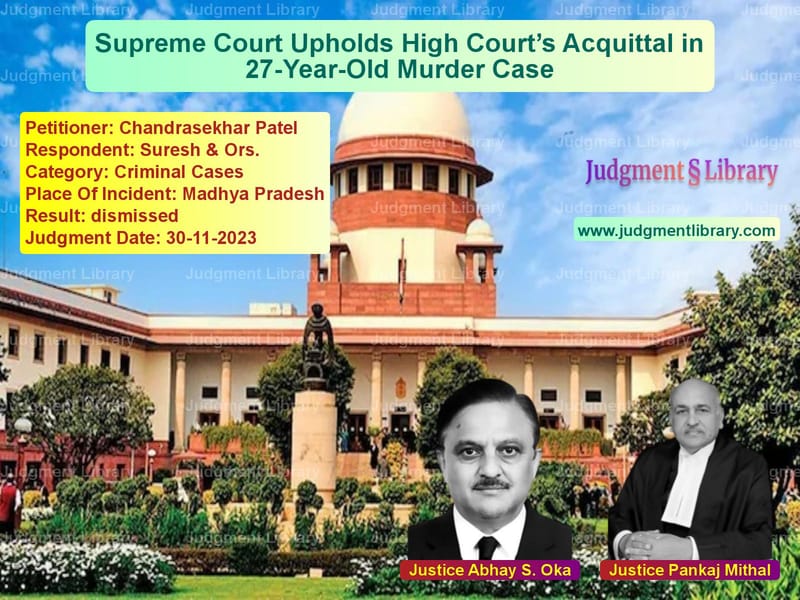Supreme Court Upholds High Court’s Acquittal in 27-Year-Old Murder Case
The Supreme Court of India recently delivered a verdict in Chandrasekhar Patel vs. Suresh & Ors., dismissing appeals against the acquittal of five accused persons in a 1996 murder case. The case revolved around the killing of Siddhnath Patel, with the accused initially convicted under Section 302 IPC. However, the High Court later overturned their conviction, ruling that the prosecution had failed to establish guilt beyond reasonable doubt. The Supreme Court upheld this acquittal, emphasizing the principles of appellate review in criminal cases and the right of an accused to fair cross-examination.
Background of the Case
The case dates back to March 6, 1996, when Siddhnath Patel was murdered. Five accused persons were charged with murder under Section 302 IPC, with one of them also facing charges under Section 109 IPC (abetment). The prosecution’s case relied on the testimonies of five key witnesses (PW-1 to PW-5), who claimed to have seen the incident.
Read also: https://judgmentlibrary.com/supreme-court-quashes-criminal-case-against-husband-in-dowry-dispute/
The trial court convicted the accused, leading to their appeal before the High Court. The High Court acquitted them, citing inconsistencies in witness testimonies, procedural lapses, and the prosecution’s failure to prove guilt beyond reasonable doubt.
Arguments by the Petitioner (Chandrasekhar Patel & State)
The petitioners, including the deceased’s son Chandrasekhar Patel and the State of Madhya Pradesh, contended:
- The prosecution witnesses had provided direct evidence linking the accused to the crime.
- The trial court had properly convicted the accused based on eyewitness testimonies.
- The High Court failed to appreciate the evidence and erred in granting an acquittal.
- Minor contradictions in witness statements should not have been grounds for acquittal.
Arguments by the Respondents (Accused Persons)
The respondents argued that:
- The prosecution’s case was riddled with inconsistencies, including contradictions in witness testimonies.
- Key questions were not allowed during the cross-examination of prosecution witnesses, depriving the accused of a fair trial.
- Independent witnesses who could have provided crucial evidence were never examined.
- The police failed to recover any significant forensic evidence linking them to the crime.
Supreme Court’s Observations
The Supreme Court conducted a detailed analysis of the evidence and witness testimonies. Key observations included:
- On the Role of an Appellate Court in Reviewing Acquittals:
- The Court emphasized that an appellate court must not overturn an acquittal unless the lower court’s findings are perverse or unreasonable.
- Presumption of innocence is strengthened by an acquittal, and interference should be minimal.
- On Witness Credibility and Procedural Fairness:
- The Court found that PW-1, a key prosecution witness, was not allowed to be cross-examined on crucial aspects, which prejudiced the defense.
- PW-3 claimed to have witnessed the crime but never explained why she did not immediately report the accused’s names.
- PW-4, who made the first call to the police, failed to mention the names of the accused, raising doubts about his knowledge of the crime.
- On the Failure to Examine Independent Witnesses:
- The prosecution did not present testimony from independent eyewitnesses, despite their presence at the scene.
- Nearby houses and a Hanuman temple were close to the crime scene, yet no statements were recorded from residents or devotees.
Key Excerpt from the Judgment
“The appellate court must examine whether the finding recorded by the Court acquitting the accused is a possible finding based on the evidence. If so, it cannot interfere merely because another view is possible. The presumption of innocence is further strengthened by the acquittal of the accused.”
The Supreme Court noted that procedural lapses, including the trial court’s refusal to allow key cross-examination questions, deprived the accused of a fair trial. The Court emphasized that an accused’s right to cross-examine witnesses is fundamental to ensuring a just trial.
Read also: https://judgmentlibrary.com/supreme-court-quashes-fir-in-alleged-fuel-adulteration-case/
Final Judgment and Directions
The Supreme Court ruled:
- The appeals were dismissed, and the High Court’s acquittal was upheld.
- The prosecution failed to establish guilt beyond reasonable doubt.
- The failure to examine independent witnesses and denial of proper cross-examination created serious doubts about the case.
This judgment reinforces the principle that criminal convictions must be based on solid evidence and procedural fairness. It also highlights the role of appellate courts in ensuring that acquittals are not overturned unless clearly unjustified.
Petitioner Name: Chandrasekhar Patel.Respondent Name: Suresh & Ors..Judgment By: Justice Abhay S. Oka, Justice Pankaj Mithal.Place Of Incident: Madhya Pradesh.Judgment Date: 30-11-2023.
Don’t miss out on the full details! Download the complete judgment in PDF format below and gain valuable insights instantly!
Download Judgment: chandrasekhar-patel-vs-suresh-&-ors.-supreme-court-of-india-judgment-dated-30-11-2023.pdf
Directly Download Judgment: Directly download this Judgment
See all petitions in Murder Cases
See all petitions in Bail and Anticipatory Bail
See all petitions in Custodial Deaths and Police Misconduct
See all petitions in Fraud and Forgery
See all petitions in Judgment by Abhay S. Oka
See all petitions in Judgment by Pankaj Mithal
See all petitions in dismissed
See all petitions in supreme court of India judgments November 2023
See all petitions in 2023 judgments
See all posts in Criminal Cases Category
See all allowed petitions in Criminal Cases Category
See all Dismissed petitions in Criminal Cases Category
See all partially allowed petitions in Criminal Cases Category







